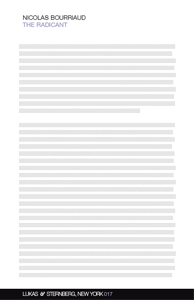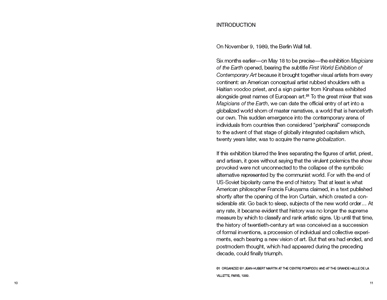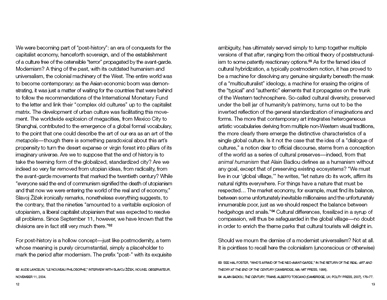As a critical methodology, multiculturalism resembles a
system for distributing meaning that assigns individuals
to their social demands, reduces their being to their
identity, and repatriates all meaning toward an origin
regarded as a political revealer. It is this critical model
that is in crisis today, this multiculturalist version of
cultural diversity that must be placed in question, not in
favor of a systematic universalism or a new modernist
Esperanto, but rather in the context of a new modern
moment based on generalized translation, the form of
wandering, an ethics of precariousness, and a heterochronic
vision of history
Nicolas Bourriaud (born 1965) is a French curator, theoritian and writer. He was the founder and director of Montpellier Contemporain (MoCo), gathering the
La Panacée art centre, the École Supérieure des Beaux-Arts and Hôtel des Collections. He was the director of the École Nationale Supérieure des Beaux-Arts de Paris from 2011 to 2015. He was Gulbenkian Curator for Contemporary Art at Tate Britain in London from 2007 to 2010 and founder advisor for the Victor Pinchuk Foundation in Kyiv. He also founded and co-directed the
Palais de Tokyo, Paris, between 1999 and 2006, and founded the curatorial cooperative
Radicants in 2022. He is the author of the landmark publication
Relational Aesthetics, published in 1998, and still inspirational today for many artists, curators, and art professionals worldwide.
Bourriaud's curated exhibitions include
The 7th continent, Istanbul Biennial (2019),
Crash Test. The Molecular Turn, La Panacée (2018);
Back to Mulholland Drive, La Panacée (2017);
Wirikuta, MECA Aguascalientes, Mexico (2016);
The Great Acceleration, Art in the Anthropocene, Taipei Biennial (2014);
The Angel of History, Palais des Beaux-Arts, Paris (2013);
Monodrome, Athens Biennial (2011) and
Altermodern, Tate Triennial, London (2009), among others. Nicolas Bourriaud was also in the curatorial team of the first and second Moscow Biennials in 2005 and 2007.





